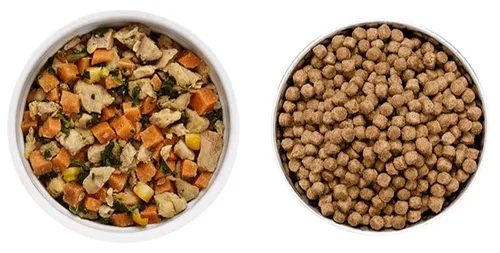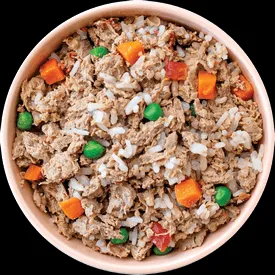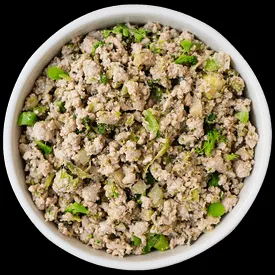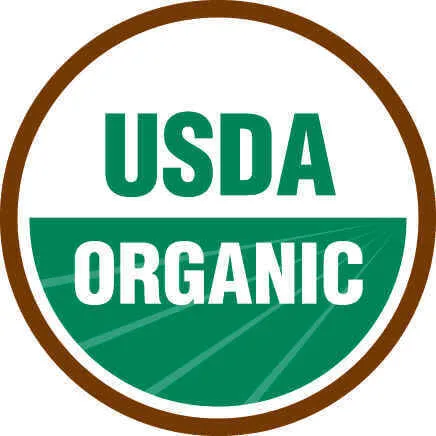Choosing the right food is one of the most crucial decisions a pet parent makes for their dog’s health and happiness. As awareness grows, many are turning to natural dog food options, seeking diets free from artificial additives and packed with wholesome ingredients. This comprehensive guide, brought to you by Dog Care Story, delves into the world of natural dog food, helping you understand what it means, why it matters, and how to select The Best All Natural Dog Food for your furry friend.
Our editorial team, supported by insights from pet nutritionists, has thoroughly examined various natural dog food options. We aim to provide you with clear, accurate information to ensure your dog thrives on a diet that truly nourishes them. Understanding the nuances of “natural” can be complex, and we’re here to simplify it, helping you make informed decisions for your pet’s well-being. Considering a holistic approach to your dog’s health, consulting with holistic veterinarians near me can offer valuable insights into their dietary needs and overall care.
What Defines “All Natural” Dog Food?
According to industry guidelines, natural dog foods must consist solely of ingredients derived from plant, animal, or mined sources. A critical distinction is the absolute exclusion of artificial flavors, colors, or preservatives. Unlike conventional foods that may contain synthetic, longer-lasting chemical preservatives, natural dog foods must rely on short-term antioxidants like vitamin E to maintain freshness. This commitment to natural ingredients ensures your dog consumes a diet free from unnecessary chemicals that could potentially impact their health.
The Advantage of Minimally Processed Foods
While industry definitions provide a baseline, truly natural dog food goes beyond simply avoiding artificial ingredients. It emphasizes ingredients that resemble their natural state. There’s a significant difference between a highly processed dry kibble pellet and a fresh or wet recipe, where ingredients are much more recognizable.
 Comparison image showing a fresh, wet dog food meal next to processed dry kibble, highlighting the visual difference in naturalness.
Comparison image showing a fresh, wet dog food meal next to processed dry kibble, highlighting the visual difference in naturalness.
Wet foods and fresh recipes are generally considered “more natural” than dry kibbles because they undergo far less processing, retain more moisture, and are prepared at lower temperatures. This gentle processing helps preserve nutrient integrity and can make the food more palatable and digestible for your dog. For pet parents exploring high-quality protein sources, especially for dogs with specific dietary needs, researching best grain free high protein dog food options is a worthwhile step.
Transitioning Your Dog to Natural Food Safely
Switching your dog to a new diet, even a healthier natural one, should always be done gradually to prevent digestive upset. A sudden change can lead to stomach issues, including vomiting or diarrhea. Dr. Gary Richter, a renowned veterinarian, advises a slow transition over 8 to 9 days.
Here’s a recommended schedule for introducing the best all natural dog food to your pet:
| Schedule | Old Food | New Food |
|---|---|---|
| Days 1 and 2 | 80% | 20% |
| Days 3 and 4 | 60% | 40% |
| Days 5 and 6 | 40% | 60% |
| Days 7 and 8 | 20% | 80% |
| Day 9 | 0% | 100% |
This gradual approach allows your dog’s digestive system to adapt to the new ingredients, ensuring a smooth and comfortable transition.
Preservatives in Natural Dog Food
One common concern for pet owners exploring natural diets is the presence of preservatives. It’s important to understand that not all natural dog foods require preservatives. Canned dog foods, for instance, are hermetically sealed and do not need added preservatives. Similarly, many fresh-cooked and raw dog food recipes are refrigerated or frozen, naturally eliminating the need for preservatives. These methods of preservation ensure the food remains safe and fresh without relying on chemical additives.
 A neatly packaged serving of "A Pup Above Fresh Turkey Dog Food," showcasing a minimally processed, natural meal.
A neatly packaged serving of "A Pup Above Fresh Turkey Dog Food," showcasing a minimally processed, natural meal.
When selecting natural dog food, always check the ingredient list for clarity on how the product is preserved. Opting for options that utilize natural preservation methods, or none at all due to their packaging or storage requirements, is a key indicator of a truly natural and healthy choice for your dog.
Key Factors for Selecting the Best All Natural Dog Food
While the FDA only requires natural products to be free of artificial ingredients, a truly superior natural dog food should meet more stringent criteria. To find the best all natural dog food for your companion, consider these comprehensive guidelines:
- No Artificial Ingredients: This is the foundational requirement. Ensure the food is completely free from synthetic colors, flavors, and preservatives.
- No Controversial Preservatives: Avoid any food containing chemical preservatives like BHA, BHT, or ethoxyquin, which are banned from natural formulations.
- Natural Moisture Content (over 70%): Higher moisture content, often found in wet or fresh foods, indicates less processing and can contribute to better hydration.
- Minimally Processed at Lower Temperatures: This helps retain the nutritional integrity of the ingredients, as excessive heat can destroy vital vitamins and enzymes.
- Looks More Like Real Food: The ingredients should be recognizable, not just a uniform dry pellet. This visual cue often correlates with less processing.
It’s worth noting that dry kibble rarely meets all these criteria, making wet or fresh food often a more natural choice.
 A portion of "The Farmer's Dog Chicken Recipe," illustrating a fresh, human-grade dog food prepared for consumption.
A portion of "The Farmer's Dog Chicken Recipe," illustrating a fresh, human-grade dog food prepared for consumption.
Natural vs. Grain-Free and Organic: Understanding the Distinctions
The terms “natural,” “grain-free,” and “organic” are often used interchangeably, but they have distinct meanings:
- Natural: As discussed, this primarily refers to ingredients from plant, animal, or mined sources, free from artificial additives. A natural dog food can contain grains or be grain-free.
- Grain-Free: This diet excludes common grains like wheat, corn, and soy. While some dogs thrive on grain-free diets, others do perfectly fine with grains. A grain-free food is not inherently natural if it contains artificial ingredients.
- Organic: Certified organic dog foods adhere to strict standards set by bodies like the USDA. These standards govern how ingredients are grown and processed, ensuring they are free from pesticides, synthetic fertilizers, and GMOs. All organic foods are natural, but not all natural foods are organic.
 The official USDA Certified Organic seal, indicating strict adherence to organic farming and processing standards.
The official USDA Certified Organic seal, indicating strict adherence to organic farming and processing standards.
Organic options tend to be more costly and can be harder to find due to their tighter regulations. Your choice depends on your dog’s specific needs, your preferences, and your budget. Providing a balanced lifestyle, including proper nutrition and regular activity, is crucial. For pet owners who need assistance with their dog’s active schedule, exploring options like doggie day cares near me can be beneficial.
Understanding Fresh Dog Food Subscription Programs
Fresh dog food subscription programs have gained popularity for their convenience and emphasis on high-quality, minimally processed meals. Most programs operate similarly:
- Customized Profile: You’ll answer questions about your dog’s age, weight, breed, activity level, and any allergies. This information creates a tailored feeding plan for your pet.
- Meal Preparation: Based on the profile, fresh meals are prepared in human-grade kitchens, often using whole ingredients.
- Scheduled Delivery: The fresh-made food is then portioned, packed with dry ice to maintain freshness, and delivered directly to your home on a regular schedule.
These services offer a hassle-free way to provide your dog with highly natural, customized meals. They are an excellent choice for pet parents seeking convenience without compromising on quality. When planning for periods you might be away, ensuring your dog continues to receive quality care and nutrition is essential. Looking into average dog boarding cost can help you budget for situations where your pet needs temporary professional supervision.
Conclusion
Choosing the best all natural dog food is a testament to your commitment to your dog’s health and longevity. By understanding what “natural” truly means—beyond mere marketing terms—and focusing on minimally processed ingredients free from artificial additives, you can provide a diet that supports their vitality. Remember to transition foods gradually and consider your dog’s unique needs, consulting with a veterinarian if you have specific concerns. Your dog’s diet is a cornerstone of their well-being; make it count with wholesome, natural choices that contribute to a long, happy, and healthy life.
